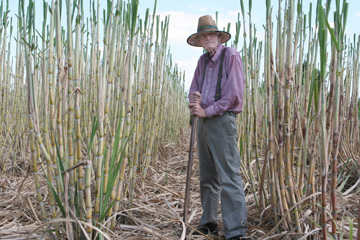BOILING POINT: Syrup Maker Joe Todd Raises Cane For Good Reason

In the sweet days of late October, Joe Todd knows that a watched pot does indeed boil. He also knows enough about making cane syrup that he seldom ventures far from his
syrup shed on Hall Road in Houston
County once his cane crop comes in.That’s because Todd, a fifth-generation
syrup maker, knows that overcooked
syrup looks dark and tastes
bitter. “If you can’t see through it, it
will be bitter and strong,” he says, as
he checks the water content with a
hand-held hydrometer.”If it was anybody’s but mine,
I’d have to stay right here with it,”
says Todd. “But I’ve done it so long, I
know exactly how to set my burners
and when I can walk away for a few
minutes, but I never go more than 5
or 10 minutes away.”From about mid-March until mid-
December, Todd and his wife, Edria,
will plant, irrigate, cut, strip, grind,
cook, bottle, label and sell around
1,200 gallons of cane syrup — all
from about three acres of sugar cane.
If the crop is good, they’ll spend four
to six hours on each batch they make.
Such is the life of a syrup maker,
a fast-fading art that once was part of
life in rural communities all over the
South.”Dad and Grandpa were all syrup
makers for the community, and we
made syrup for everybody,” said
Todd, who is 74 and retired from both
the Montgomery Police Department
and the Department of Corrections.”Everybody in this area had a cane
patch, and somebody in the community
made syrup for everybody.
We sweetened tea with it. We made
cakes, pies, cookies, teacakes. That
was sugar for us. … I even remember
Dad tearing everything down
and going to another community.
He came down almost to Ozark and
stayed a week making syrup. But
people had to have syrup — it was a
part of life.”For the Todd family, it’s always
been a part of life. Today, Todd even
uses some of the same hand-made
tools his grandfather made from longleaf
pine and old wagon parts. “My
granddad said he and his granddad
were stripping cane in October 1864
when they saw (my great grandfather)
walking home from the war,” said
Todd. “Grandpa said, ‘I’m ashamed to
admit it, but I never had the thought
that I’m glad my dad survived the
war’ …he said, ‘All I thought about
was I won’t be hungry no more.'”It’s a tradition that Todd wanted
to carry on himself, but wasn’t able
to do so when he left home. “I moved
out of the house up there with Mama
and Daddy on Pea River Swamp, and when I was 21, went to work for the Montgomery Police Department,”
says Todd. “The first day on the
force I put (civil rights leader) Rev.
David Abernathy in jail. … All I ever
wanted to be was a dirt farmer. But
I didn’t own any land, I didn’t own a
tractor and help was getting hard to
get by then. I wanted a family and so
I had to seek another way of making
a living.”It wasn’t until retirement in 1997
that Todd snatched up a peanut farm
in danger of foreclosure and began
pursuing his dream as a syrup maker.Today, he’s regarded as one of the
best around. Vince Lamb of North
Augusta, S.C., goes even farther,
calling him “the best in the United
States.””Nobody knows as much about
syrup making as Mr. Todd,” said
Lamb, who frequently makes the
500-mile roundtrip trek just to spend
the day watching Todd make syrup in
hopes of picking up some knowledge
he can use in making jams and jellies
for his own gift basket business. “I’ve
learned a lot from him.”Many syrup makers, Lamb said, lack the patience to make the kind of syrup Todd turns out.”They’ll get the fire too hot like
it’s about to boil over, and they’ll
have three people with buckets
throwing the syrup up in the air
trying to cool it off,” said Lamb. “By
the time, they pour it up, I wouldn’t
eat it. It’s syrup and to a lot of people
who don’t know syrup, that’s good
syrup. But THIS is good syrup. This
is good stuff. It looks like honey.
There’s no sugar in it, no impurities.
That’s what he’s got here — the
knowledge and knowing when it’s
cooking right and smelling right.
That’s something you can’t write on a
recipe. That’s an art. … I really enjoy
coming over here. I tell him, ‘I don’t
want to interfere with you, but when
you’re cooking, let me know and I’ll
be here.’ I just come over to watch.”So do the countless tours and
school groups who visit the Todd
Cane Syrup Farm as it is listed on the
state’s agri-tourism list. “We’re one
of the few that don’t charge anything;
that’s why we have so many visitors.
If you look at our guest book, we’ve
even had people from Romania and
Modesto, Calif.”For those who can’t make it to
the farm, the Todds also ship syrup.”We ship a lot of syrup. Hall Road is
a mile long, but we ship more syrup
to Littleton, Colo., than all of our
neighbors put together.””This is a free labor deal,” Todd
added. “We try to get our expenses
back. The going rate for cane syrup is
$10 a quart, and our price is $6.50. ….
We don’t want to be in the moneymaking
business — we just want to
be in the syrup-making business.”
For more information about Todd Cane
Syrup Farm, call (334) 677-7804. The
farm’s fourth edition of “Todd’s Syrup
Cookbook” is now available for $12
by writing 512 Hall Road, Dothan, AL
36301.
